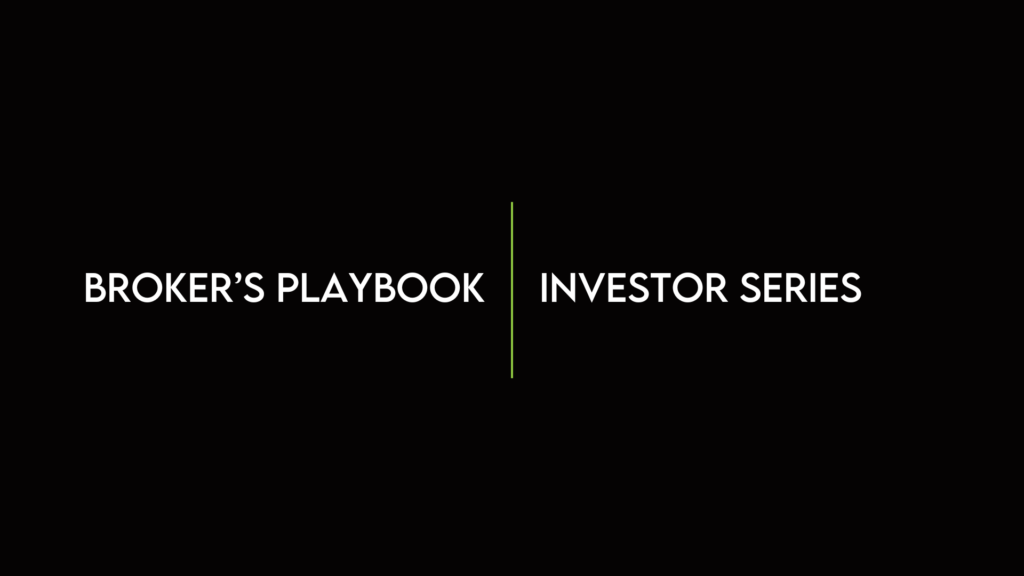Welcome to Broker’s Playbook! Are you ready to join Ben Julius and Bobby Puim on an empowering journey into the world of real estate? Tune in for an inspiring talk that you won’t find anywhere else, as these two old friends share their stories of success. Take this opportunity to learn, grow, and be empowered today! Don’t miss out – get inspired with Broker’s Playbook now!
Bobby Puim: Welcome back to The Broker’s Playbook podcast, everyone. My name is Bobby Puim. I’m the director of operations, the COO here at Brokers Playbook. And normally I’m in the background. I don’t often host the show, but when we have a truly special guest, I like to hop out in front of the camera. And I’ve got an old friend here today that I think is just super special. So Ben Julius from the sorry Lionheart Developments is that did I get it right? Lionheart development? Yeah. Lionheart development. You’re the CEO. You’re a long time friend of mine. We used to work together back in the day, travel in this country teaching people about how to invest in real estate. Back with an organization called Key Spire. But welcome to the show, my man. I’m super happy to have you.
Ben Julius: I’m so stoked to be here. Can’t believe I had this circled on my calendar for several weeks now. So so glad to be here. Thanks for.
Bobby Puim: Having me. And you thought you were getting Simeon today, but. But I showed up to take over the show today, right?
Ben Julius: You did. I don’t know how to answer that question, but I was excited to talk with Simeon, but even more excited to talk with my old friend.
Bobby Puim: There you go. That was too kind of you. Thank you so much. Listen, you’ve been in real estate a long time now. About how long? Tell the viewership.
Ben Julius: You know, we we started our real estate venture in 2017. So long time by years. But it’s flown by, right. So we’ve been in it for about six, six years now going on seven years, and we’ve kind of scaled quite quickly and really all through the power of of leverage and not kind of. Settling for the status quo and moving forward and growing to a massive development company. I wouldn’t say massive, massive in my terms, but a development company that has right now close to $300 million under management.
Bobby Puim: That’s incredible, my man. I know that when we were traveling together back and we’re going to call it 2017, 18, 19.
Ben Julius: Yeah, 18 and 19.
Bobby Puim: Yeah, something like that. Like it almost felt like we were just starting out, like we barely had anything at all. And even then, I mean, I’m not going to sit here and say portfolios were envious to everybody. These are big to us in those moments. And and I’m just I’ve been blown away with the ability that you’ve had to, to be able to grow in the way that you had. So I want to take some of the viewership down that pathway because it takes a village. Sure. It absolutely isn’t a one man show over at Lionheart. No, correct me if I’m wrong.
Ben Julius: Definitely not. There’s so many behind the scenes who really? Does I want to say does everything, but is the the driving force behind a lot of things. So, you know, I’ll take it back to before real estate here. So in 2015 I was coaching collegiate basketball out west, and I was about 15 years into a coaching career via assistance, moving on to seven years as a head coach and quite successful on the court. Had a great graduation rate with my players because I demanded a lot from them. However, I wasn’t always liked by administrations because I was had the American mentality, because I spent a lot of time down in the US and I was a bit old school coach. My dad was a university coach, so I gained a lot, inherited a lot of loud yelling techniques, which my players never. It never bothered my players, but it bothered onlookers sometimes and it bothered administrations. So 2015, I had a falling out with an administration over some life situations, and I was beat up mentally from always trying to keep everybody happy and was in a, you know, a dark place when I decided to leave. Alberta. If it wasn’t for my parents, I would have legitimately been homeless. So, you know, kudos to them. And I’m sure, like I would do that for my kids and a lot of parents would, but some parents wouldn’t. They were like, you screwed this up. You’re on your own. Figure it out. So I’m very fortunate, and I’m sure my dad was probably like, he’s got to figure it out. But my mom, being the beautiful soul that she is, was like, no, we’ll take him in as she does, as she would have done with any of her kids.
Ben Julius: So I was in a really interesting place. You know, it was I don’t want to say it was a depressive state, but it was. A situation where I was blaming other people for things that happened to me that I did right, that was direct result of my personality and the way that I approached things. So then early 2016, I met my wife, my now wife, and she literally grew flowers in the darkest parts of me and really helped me kind of grow and change into the man I am today. And, you know, I have an addictive personality. So it wasn’t like I was addicted to drugs or alcohol or anything like that, but it was. I was addicted to TV shows. I was addicted to video games at a point I was addicted to, just really not. Caring about like I was. I never knew wealth, right? I never was exposed to it. I mean, in certain areas of my life, I was, but I never thought it was attainable. And I never thought that I could change my stars. As you want to put it back in medieval times, you can’t change your shirt. You’re born. This. This is what you are. So I was born a coach. Through and through, right? So I always thought that I was going to be coaching college basketball, making 60 to $100,000 a year, eventually having a nice life. Right? Well, I didn’t after I was kind of moving forward with that.
Ben Julius: I didn’t want that. Right. So we’re driving along. I’ve always talked about I’ve always known the power of real estate, being involved in institutions. You see how much student rentals make. I saw how much my guys were paying a rent, you know, versus they’re renting from my assistant coach at a time. And I saw what he was making. So I was like, okay, why can’t I do this? So that was always in the back of my mind. And we’re driving through. We heard something on the radio. I’m like, oh, we should maybe go to this. It was in Hamilton. So we went to it. It was a convention center. It was just a two-hour show. We got there. I thought it was a network marketing thing. I’m like, let’s get out of here. My wife said, no, sit your ass down. We’re going to we’re going to listen to this. Went to a three-day course. From there we joined a group that we really met some fantastic people, learned the power of leverage and in our real estate journey took off. So from there we bought a turnkey duplex. I say turnkey because nothing’s ever turnkey and never. And that’s really how we got our feet wet. Right? Was by just by learning. And then I really started to grasp construction when we purchased a conversion. And my buddy, who in my previous sales job, he was a geek by trade, so he was going to help me do this. And then he just ghosted me. He’s like, this is fantastic.
Bobby Puim: Just the best.
Ben Julius: Yeah. You know, we’re getting married in a couple of months. So we go to this project and so.
Bobby Puim: See you see. Yeah.
Ben Julius: Right. So I learned everything self-taught YouTube, how to do a lot of things and made a ton of mistakes. But you work through it. And from there we just kind of progressed, progressed built our portfolio to Triplexes, Fourplexes, five Plexes. And then we realized that being a landlord wasn’t really for us.
Bobby Puim: So take me back a minute. You mentioned something when you were back in Alberta, right? You’d never been exposed to wealth in that way, right? Right. When do you think the first time that was it, the was it the two hour seminar, the old MLM? We’re going to sell you something today. Or when was the first time that you had sort of that aha moment that like, not only is this attainable but like, we can do it and we can do it.
Ben Julius: Well, yeah. So I think I always felt that I was meant to do something big. I know that sounds so cliche because.
Bobby Puim: I have the same feeling. Honestly. It’s something that’s ingrained in you. It’s like, I can do more. I’m better. That’s right. And I know that I can do it.
Ben Julius: And I was getting that from coaching because I was helping turn boys into men. And when I’d sit down with a family and ask them to come play for me, I never guaranteed playing time. I never guaranteed anything. But I told parents, and I told kids that you’re when you come through my doors, you’re going to come in as one thing. And when you leave, you’re going to leave as a man. And that was my biggest thing. So when coaching left, there was a major void. And my wife helped fill that void and she really was like, okay, now it’s not like I could live in a basement apartment. I could drive. In 1981, Ford truck that I was driving out west because I didn’t have any money. Right. So I was like, but now I saw a future. And I was like, okay, how am I going to do this? And she really kind of helped kind of pave things through. She saw me in a sales job that I hated. Um, so it was really her that instilled that. Take your coach, your lessons from coaching and apply it to something that you’re passionate about.
Ben Julius: And I couldn’t find anything that I was passionate about until I went to real estate, and I think. I’ve always been ultra competitive. You know, I’m a I’m a middle child, so call it what you will call it middle child syndrome. Whatever. I always want it to be better than my brother. And sure, I want it to be better than my younger brother, right? So I always had to kind of work hard. And my older brother was a fantastic basketball player. He played professionally, he coaches professionally now. He’s had a great career in basketball. I was never that good. I can hold my own. I could shoot the ball, but I always had to work and I didn’t have the work ethic that he had in basketball. So. Then when I left my sales job and joined the Keyspire team. And that’s where I met you and a couple of other people that I was really like, okay, these are people I can align myself with, and I love you guys, but I want it to be better than all you guys.
Bobby Puim: I think that that’s true of anybody that works there, and maybe that’s a sports mentality. Maybe it’s a little bit of, I don’t know, drive right that some people have that others don’t. But but I always appreciated that about what our like our team back then was because like I actually like a sports guy too. I played hockey, not basketball, all the things. But that’s what I always loved about being around those guys. Not only did we get to sit around and learn from one another four days of the week, like we’d fly to Vancouver, and what do you think we’re talking about? Nobody’s sitting there watching Cocaine Bear on the plane, right? Which is a message I got from my wife recently. You’re really sleeping, right? Sleeping or. Or. We’re talking about the next mechanism to pull upon for your portfolio. Yeah. And I think what I want all of our viewership to take away, because we have a huge viewership on the real estate side of these things, the real estate professionals is that is that there is a grind on both sides of what this transaction is. Totally. It is an easy to be a realtor in this particular moment. It isn’t easy to be a mortgage broker. The media doesn’t help in any real way. These things can be disastrous, and when you have the wrong mindset about it, or you don’t have a team put in place to be able to help you to get over that next little hurdle, it can be an awful place to be.
Ben Julius: It’s funny you say that because yesterday I had. A bout of imposter syndrome in the morning. My wife had an appointment, so I was home with the kids, so I wasn’t, I was trying. Our one son was home from daycare because he goes to daycare. He’s sick. Goes to daycare sick, right? So anyways, I’m watching the kids for a couple hours while she had to go to an appointment and the one is sleeping and the other one is just playing with his toys, which was great. I was able to kind of get a couple of things done, but I sat there and I looked at it, looked at my family, looked at where we are, and I was like. Okay. What the hell? How did I get here? What am I doing? What if I screw up and do these things? And I think that’s a natural feeling. And I think that you have to have that feeling. Because I always say that you can’t be afraid of failure, but you have to be afraid to fail.
Bobby Puim: So. Well said.
Ben Julius: Right. And people like you’re like, well, that doesn’t make any sense. I’m like, no, it does. So you can’t be afraid to fail because there’s no such thing as a failure. You you have to learn from your mistakes, but you have to make mistakes in order to do so. And but you have to make calculated mistakes. So you can’t be afraid to make those mistakes, or you’re going to have analysis by paralysis or paralysis by analysis, or you’re going to have that. So, you know, I’ve always been the one my wife likes to call it. I’ve always been the dreamer. She’s been the grounder. Right?
Bobby Puim: Oh my God. It’s the same at our house, you know Laura. Yeah right. It’s engineer mindset. If the numbers don’t make sense, if we’re a decimal place off, right, nothing is going to happen. And I and I love and appreciate that about it because I would have gotten all of those numbers wrong and then just pushed forward anyways. Right? Right. But but we you’re so correct in this. It’s when there’s a gas and it breaks to these things, it’s the mistakes become less and less and less. But you’re still making them.
Ben Julius: Yeah. If you if you think you’re going to enter a project and not make a mistake, you’re crazy. Yes, you’re crazy. And, you know, we always we were walking the dogs last night and we were talking about how nothing ever works out, how we plan, which is fine as long as it works out.
Bobby Puim: And. And yet here we are. I say that to Laura all the time. That’s right. And yet here we are.
Ben Julius: Yeah. Like like I look at, you know, in 2000, in January of 2016, I had nothing. I lived in my parents basement at 35 years old, turning 36. Didn’t have a girlfriend, didn’t have a car, couldn’t afford a car, had to borrow my parents vehicle to get to a job. It was an hour away just so I can have something while I looked for something else and to where I am today. And it’s just like that only happened in six, six, seven years, right? And it’s just it’s the mentality that I’ve had throughout my whole career, my whole life. It’s that you wake up, you go to work, you do things. I don’t look back sometimes, like sometimes you have to look back. But what happened yesterday doesn’t affect today because you know what? Today is a new day. As I said to you this morning, I, you know, I left the gym. I came here early to beat traffic. So I worked out in Toronto, left the gym, and I saw a bunch of guys walking. They just looked like like misery. And I’m like, it’s 30 degrees out at 9 a.m. and in October, so. And you’re like, if you don’t like your situation, change it. And I think that needs to be said. You know, for a lot of people it’s woe is me. And in Canada we’re taught that get a, get a good job, go to university. I first of all, I should never went to university. I’m not a university guy, but go to university, get a degree, get a job, get a house, get married, have kids, pay off your house, retire at 70.
Bobby Puim: Yeah, sell your home. Sell your home. Live on the proceeds of that. Hope your kids can take care of you. That’s right. You’re 85 because you’ve run out of money. All the little.
Ben Julius: Things, you know. And I always say I recently joined a group down in the US in last May. Actually, that has really changed my mindset on a lot of different things, and it’s really helped me scale my business mentally, not so much from an actual investment standpoint, but from a mental standpoint. Getting into a different room really helped me.
Bobby Puim: That’s so interesting. So take me down this path, okay? Because what I find I work with our realtors at the Canada team every day, all day long. It’s it’s my lot in life. It’s what I joke about. Yeah, yeah, yeah, I love it because I believe that they have an immense amount of freedom and all of the tools to be successful and, and, and, and everything that they could ever want from a team. When I go audit other teams, which is a part of what I do. Yeah, right. Like I try to take the best of and then distill it down to where can we add this for the Canada team? But half of those tools never get used. Half of them are sitting under dust in my office because we can’t seem to implement them, or nobody wants to deploy them. But I wonder if it isn’t a mindset scenario to say if I was to use this thing right? This is a tool in my tool belt and I’m going to understand how to use it better to grow my business. Totally.
Ben Julius: It’s a you can’t. You can bring a camera to water, but you can’t force him to drink.
Bobby Puim: And that’s I love that saying, but I’m not sure that that’s quite what it is like. I don’t mean to disparage anybody, I just think that especially on the realtor side, a mortgage broker side has to be a disaster. Right now, I’m not one I can’t speak to two being one.
Ben Julius: No, but but it’s not going to be fun for the next two years.
Bobby Puim: But but here’s here’s a buffet and you get to eat what you want. And the mindset becomes I might just starve instead.
Ben Julius: Yeah, it. So everybody wants to talk about being a beast, right? Everybody wants to talk about being a beast. But what is a beast? I can tell you right now, until you have this mindset, you will not be successful as your own because a realtor is their own business, like you are responsible for you. Nobody else is. You can have a team lead, but you’re responsible for you. So what you put in is what you get out, right? And everybody’s like, oh, I’m a beast. I go to the gym at 5 a.m. or I work out five days, six days a week, and I eat healthy. That’s good for you. But what a beast. A true beast is somebody that has hit rock bottom and is excited to hit rock bottom because there’s nowhere to go but up. And it’s a he’s grateful for that, for that feeling. And that was me, right? It took me seven years to figure that, six years to figure that out. But that is what a beast is to me and you have to find that in you. So like when I talk about mindsets and you talk about different things and having opportunities for tools, I didn’t get the tools in my tool belt. I thought I did until I went to a different room. And I think that, you know, everybody goes through these real, these real estate, these free real estate meetups, they’re a joke. I’m sorry to say that for anybody who runs them, I respect you for taking the time out of your day to organize this, and I commend you for that. But in all honesty, it’s all people trying to find money in these rooms. I go to some of these things. All I do is coach and I don’t want to do that for free.
Ben Julius: Right? Like you have to like some of what you’ve gone through your pain. Pain and and pain and reflection. Equal progress, hands down. Right. But that’s your pain. That’s not somebody else’s pain. So you trying to tell people how to use that or do that is like beating your head against a brick wall. It’s just not going to resonate. So I was like, I went to this conference down in Miami. It had nothing. There was a huge real estate component to it, but it was more on the financial side of things. And it was like, I need to know for my business. I need to know how these inner finances work, because I always partnered with finance guys. Right. And I said, you guys take care of the financing. I don’t want to deal with it. Let’s just roll. Right? I’ll take care of the other side. You take care. But you, you know, as a good coach, you got to know how to run your defense as well as your offense. Yes. Right. So I need to learn learn this stuff. So one of the things that I went down there and the speakers that were there were unbelievable. They weren’t like there was finance speakers and then there was speakers, speakers. So a couple in particular I really resonated with, and I sent my wife some questions like, I want you to answer these for me, right. Because we are a partnership. What kind of man do you want me to be? What kind of man do you see me as right now? And what kind of father do you want me to be? Just answer those for me.
Bobby Puim: So crazy. Interesting has nothing to do with business. Nothing to do with the financial side of the business? No, nothing about the growth that you’ve seen over the last, whatever, eight years. Seven years in business. But you as a person. That’s right.
Ben Julius: So my journey as a person, I feel like through Key Spire and the friendships I made, it kind of hit a wall, right. Especially once Covid hit because we weren’t together every weekend. Exactly. And we’ve all talked about how we that drove us. So like when one of our colleagues got a property, he got a project.
Bobby Puim: I had to get two more.
Ben Julius: Exactly. But we lost that. Sure, we talked on the phone, but everybody got busy and we went by. We went, you know, all this. Anyways, so I got down to this room and to this conference, and one of the things that I really took out of that is you got to pay to get into rooms. Is that simple. And when I want to go to a mastermind, I want to be the dumbest guy in the room.
Bobby Puim: I couldn’t agree more.
Ben Julius: I don’t want to do a mastermind where I can just pick up the phone and call my friends who were my friends before a mastermind, and I’m happy for everybody’s success. But that’s not what I want. I want to in order for me to level up, I need to be with people who are better than me. It’s that simple. So I got into this room. One of the things that I changed in my life when I came back was. I wasn’t. I didn’t understand until I went down to this conference how much my like, I always tried to get up early and get things done. It didn’t work for me. I couldn’t do it. I have a three year old and a one year old, three year old and one year old now. So in May, last May, it was, you know, eight month old or six month old, whatever it was. Yeah. And time was like, you’re dead at the end of the day. Right? So I flipped on Netflix. My wife and I would binge watch. We weren’t talking because we were just watching a show mindlessly. Because we. We didn’t want to touch each other because we had kids crawling all over us, so we just kind of disconnected ourselves. And I said, when I came back from this conference after listening to these guys speak and had nothing to do with business and everything to do with life and mindset, I said, no more TV during the week.
Ben Julius: Just won’t do it. Right. Stop it. Read a book or don’t read a book. Talk to your wife. Talk to your partner. So I mean, there’s times where I’m like, oh, I just want to I just want to just watch one episode clear my mind, you know, and it’s I every once in a while, I’m not going to lie, I’ll throw when I stretch because my old body is not what it used to be. So I’ll throw something on for half an hour when I stretch at night when nobody else is around. My wife has not gone to bed. But if I don’t go to bed before 10:00, my next day is not productive. Oh, right. And it’s it’s funny, I got a FaceTime call last night from a really good friend at like 945 while I was in bed. I didn’t answer it. I’m like, I’m like, I’m doing my bedtime routine. Yeah. So, you know, everybody wants to post videos of them working out in the morning. And, you know, this is what I’m doing. I’m doing this, I’m doing that, and I just work out. Stop posting videos about it. Stop posting videos about everything. If you’re not giving value to your constituents, stop doing it.
Bobby Puim: See, me and I have talked about that particular thing a ton lately. It’s it’s a difficult world out there right now to sell a product like what we’ve chosen to sell. And what does somebody do? Who are they speaking to when they do these things? Is they they do a quick dance, they put on a catchy song and they talk to their ideal client who doesn’t actually exist in the market in the moment, a first time home buyer with 20% down and all of this bullshit that like, you’re just looking at, like, who are you really speaking to? Yeah. Did you just turn off the 99% of your entire database because of the shit that you just posted? Yeah I wonder, yeah, but the mindset around the whole thing is to find what works for you is to change your situation because you have the capability to do so. You’re a single agent struggling. The team has wide open arms as an example, and there are a million teams that you could be doing this with. Totally. You don’t like your team structure or the fees that you pay in order to be on a team such as ours. What did you say earlier? You pay to be in the right room?
Ben Julius: That’s right.
Bobby Puim: That’s the entire reason that we would charge the fees that we do. That’s right. Think about it logically. Change your mindset about what it is and you’ll flourish because of it. Take me back to 2018. You guys decide to turn on Lionheart Developments.
Ben Julius: So Lionheart Development started out as a game investments, right? And Lionheart Development really. We rebranded last year into Lionheart Development, but A-game Investments was moving forward. My my brother had started a training agency called A-game Hoops, and I kind of just and I worked with him on that and everything. So we kind of just took that. I’m like, I want to bring my A-game to everything we do. So let’s that’s a great name. A-game investments, let’s do that. So that’s what we did. And then we felt as we started to get into bigger deals that that was a little bit Mickey Mouse. And it was great for us when we were doing, you know, working with the smaller clients where we needed to raise a couple hundred thousand dollars for a project. It was cool, right? But now we’re got a couple million dollars. We needed to have a stronger brand. And and Lionheart development really rose from the characteristics that I took from coaching and the characteristics I take from from being a father. And realistically, it was what I want to embody as a person, you know, integrity, courage. Doing everything with your heart being, you know, the lions. The king of the jungle line doesn’t really live in a jungle, but it’s it’s just a saying. Semantics. Semantics, right. So we want it to be that, you know, fierce when we need to be fierce, compassionate when we need to be compassionate. But really, the lion, the mentality of the lion always. Is kind of in the forefront of what I’ve always done. There’s been two animals that I’ve always kind of gravitated towards, and one is the wolf, because as a team, you’re in a wolf pack, right? Well, now I have a team, but they’re really small team. It’s myself, my wife and we hired another guy who’s a former player of mine who? 23 year old. We’re molding him into a developer, essentially. But the Lionheart development really now operates three major developments and looking to close on a fourth down in Florida with a team down in Florida next week, actually.
Bobby Puim: So so when you’re working with a team like that, you mentioned the team down in Florida. There’s due diligence that’s involved with this type of thing, right. What are you searching for when you do this? Like we’ve talked just about nonstop about the mindset and getting getting those things right, becoming a better person to become the person that you want to be. All of those things when you’re looking for a team to work with, is it that characteristic first or is it their knowledge base? Second, walk me through the things that go through your mind when you want to work with a team like that.
Ben Julius: I took three different programs to the top. Top ten nationally. All three programs I coached. Eventually, at one point, we were top ten nationally. Not because I had the best players, but because I had the right players. And when I look for my team, it’s the same type of characteristics. It’s integrity, the knowledge. I think for most of the these people you’re interviewing or like the construction management team, the architects, the knowledge is all relatively there because you’re not. Like I always said, when I was recruiting a kid, I knew he could play basketball, but when I would go recruit him, I would look at the intangibles. Does he dive on the floor? Does he? You know what? What happens when there’s a bad call? How does he react when the coach pulls him off? How does he react? So it’s those things that I look for when I interview potential team members and bring them on to my team. And that’s why I’m so confident with some of these developments that we’re doing because of my team. So when we hire a company like Wilkinson Construction to manage our developments, that wasn’t an easy decision to do. It was the course over several interviews. It was a course over several reference checks with other people, colleagues in the in the workspace. They’re very prevalent in the mid rise range. I don’t want a high rise developer working on an eight story building. Why? Because it’s not important to them.
Bobby Puim: It’s the same analogy. I don’t want a commercial leasing specialist finding me my primary residence. Exactly. It’s the same thing. And I think if we distill down what you’re talking about, it’s everybody has the book. Everybody can find the right article to read. That’s right. It’s what do they do with it matters the most.
Ben Julius: So. I. When I find my team, that’s my team. I don’t go, I don’t go elsewhere, you know, and my architects and my planners, they know that. So I can call my planner and say, what can we get on this site? And he’ll give me a quick high level. Is it going to be easy to get approved? There’s going to be difficult to get approved. It doesn’t charge me. Right, because he knows that if we go through with that, he’s getting the business. And I think that that’s built through relationships. So one of the things that we differentiate in our marketplace with our condo developments is expandable living system. So people are like, what is that? I mean, it’s basically we take a 350,000 square foot apartment, sorry, 350 square.
Bobby Puim: Foot, square.
Ben Julius: Foot apartment tiny or condo tiny. And we make it into a 700 square foot without. Adding floor space. How does that work? Well, your bed goes up and now you have an entertainment area, a living room, right? So now you have a living room. Your bed comes down, now you have a bedroom.
Bobby Puim: When you showed me this, I had seen it once. I think it was like on TikTok, and it was the most incredible thing that I thought I had ever seen. Like the future of potential living and the deployment of these things in huge cities. Tokyo, New York. I was blown away to know that this is where we find ourselves in the Canadian marketplace as expandable living spaces, to be able to bring things back to an affordable sense. That’s right, I was blown away. Please continue.
Ben Julius: So it has an entertainment center that I press. The button opens up to a home office. So now a 25 year old at a university can get into the marketplace affordability. We’re not talking about affordable housing or government subsidized housing. We’re talking about affordability in the marketplace, which I think is the missed gap that we never talk about. Everybody was like, we need more affordable housing. What’s affordable housing?
Bobby Puim: It’s that’s so relative to the individual involved.
Ben Julius: Exactly. Right. So affordable housing in Toronto is a lot different than affordable housing in Hamilton. Yeah. Right. So everybody wants to talk about this. Well it’s affordability in a marketplace. You make one. It’s a ripple effect. So as soon as you create housing at any level you create more housing. Right. So I get somebody into the marketplace in five years they’re going to level up and vice versa. Right. And they leave a rental. They open up a rental space. Right. So if you create a luxury, this is why I never begrudge anybody who creates who builds a luxury home. You build a luxury home. Nobody’s buying that as a first time home buyer. Right. They’re going up and then. So now they create a whole step that everybody now levels up. And that is how housing is created. So it doesn’t matter where you create housing, what market you create housing in, as long as you create doors, you’re going to be successful. We struggle in Canada because we have to create. We’re mandated in order to drop housing prices to everybody. There’s a number out there. We all know what that number is. But if you break it down, it’s actually 6500 homes a day for the next six years. And when you like, I think we all get desensitized by numbers. So we’re like, oh, we got to build 3.5 million across the nation. That’s easy to do. No. When you break it down, that’s 6500 homes a day. That means a door. Somebody is opening a door to walk into 1600 homes a day.
Ben Julius: In order for us to to make a dent in this affordable housing crisis. Right. Like the affordability. So we’re trying to do our part. Lionheart development is like, what can we do? So what we’ve done is we’ve purchased a 91 site plan approved unit. We’ve now increased by 41 units. We have 132 units. By using this expandable living system, chopping up the whole we redesigned the whole interior building, cost us about six months on the design side, but it needed to be done. On the other development, we went from 111 to 145 by using by redesigning the interior of the building, not the exterior footprint, but the interior building, in order to incorporate these systems now and allow people to enter this marketplace. And we really want to use this system on transit lines. And I think that, you know, our, our mantra is we want to create housing that somebody is proud of and that. If I have to choose between a vehicle to get to work and a home, I want them to be able to choose the home because vehicles. I mean, listen, homes are depreciating assets as well. The land appreciates, the home depreciates, but a car is the worst investment that anybody can make. I want people to be able to invest and better their lives because I was never taught these things. Right. It was. And it’s not my parents fault for not teaching us. It’s just my generation was different, right? We, the baby boomers, we were the tail end of that.
Bobby Puim: We had different focuses. We had these amazing parents that my parents came to this country. My dad came to this country young, right. Grew up in Canada. My mom is Canadian. They allowed us to focus on becoming the best hockey goaltender. That’s right. That I could be. Or the best power.
Ben Julius: That’s why you’re a weird dude. Because you’re a.
Bobby Puim: Goalie. Oh, my God, it’s so weird. But. But, like, we just didn’t have those focuses, right? But my immigrant grandfather, totally, 1,000% did. How do I better my life in these ways? What can I learn to do that?
Ben Julius: That’s right.
Bobby Puim: So, like, I appreciate exactly what you’re saying because it’s an opportunity to get into the marketplace. And if that’s what Lionheart Development is going to focus upon, it creates another step to this entire thing. That’s right.
Ben Julius: And that’s our mantra, right? That’s our investment thesis is to create affordability in the marketplace that somebody can be proud of. That’s it. It’s a very simple thesis and it works. And that’s what we build our company off of, and that’s what we go after our developments. We will not touch a development that doesn’t give the opportunity for that. So we have a potential. One of our properties is 100 townhomes. In those townhomes we will create in one of the bedrooms the system. The system is called the Ori living system. It will be a bed with a desk underneath. So now in your second or third bedroom you have an actual office. I think if you do not have space for an office in your home, you’re missing a huge market pool because most people now can work one day, two days from home. Unless you unless your job is an active job, a nurse, teacher, whatever. But if you are in business, if you’re in sales, you generally have the opportunity to do 2 or 3 days a week from home.
Bobby Puim: And having a space at home to be able to do that in the most functionally successful, the most functionally perfect way for you will allow you to be the best possible version of yourself.
Ben Julius: So that’s what we’re about. I love it, and that’s what we’re trying to attract like minded investors who want to get involved in the LP side of these projects. There’s lots of room in some of them. And and at the end of the day. I want an investor who said I’m helping with affordability in our country, and I don’t just want to make listen. At the end of the day, we also going to give you 16 to 18% return on your money.
Bobby Puim: We can be as altruistic as we want to be. We’re in it to make money as.
Ben Julius: Exactly.
Bobby Puim: Right. And I mean, we have no problem saying that because it’s the truth. Exactly. And that’s what transparency actually is in this business. Benny, give me three things, okay? Whether it’s one for the investor, one for the one for the real estate professional. But three things about what we talked about today that people could use as their playbook. It’s broker’s playbook for a reason. Give somebody a playbook.
Ben Julius: Find a nighttime routine that flows into the most productive day possible. I can’t stress that enough. Don’t. Don’t fall apart or I have to get up and go to the gym. I got to get up and write in a journal. I got to be my mindfulness. Don’t fall into that trap. Find something that works for you, that you can be better than you were yesterday. That’s the most important thing. Can I be better than I was yesterday? So that’s number.
Bobby Puim: One. Number two is do not.
Ben Julius: Don’t care what others think. It’s hard in today’s world to, you know, like we’ve talked about social media, all these things don’t care what others thinks because at the end of the day, they don’t care about you. There’s no loyalty.
Bobby Puim: They think about you far less than you think that they think about you.
Ben Julius: You are the only person that matter and that tandem goes along with your why. Have a why and you know the proverbial why. Oh, I want to do it for my kids. No you don’t. You don’t. Your kids love you no matter what they’re going. If you live in a trailer, they’re going to love you. You’re their parents. Screw that. Find a why that is dark. Deep. That gives you the discipline, not the motivation. And that’s my third. The discipline. You can be as motivated as you want. You can listen to all these speakers. You can read all these books. But what is intrinsic is the discipline. And if you can’t have that discipline, it doesn’t matter what line of work you’re going into, you’re going to be okay with mediocrity. And discipline is excellence. And in order to have that, you cannot be okay with being mediocre. You have to be. You have to strive for success and not like, yes, you got to celebrate some small wins because they don’t come a lot of times, especially right now. But you have to have the discipline to. Go to bed early so that you can be productive the next day. And that’s why it’s my third. Discipline is the most important thing. If you don’t have it now, it doesn’t matter what you do, your motivation will dip. Your discipline is to do things that you don’t like to do and pretend that you like them.
Bobby Puim: Regardless of whether you like them or.
Ben Julius: Not.
Bobby Puim: That’s it Ben, I truly believe that the best things in life are the simplest. So, so often what we do to ourselves is overcomplicate everything. But simplicity doesn’t mean easy. No, right? Real estate investing or real estate development or real estate professionalism. Working on the real estate side of things is simple. It’s just not easy. And when you can do what you just told people to do, when you can do that for yourself, you will be better for it. Absolutely my man. Thank you so much. I feel like we could do this all day long, but we’re probably three hours into this episode at this point.
Ben Julius: Yeah, yeah, we are my man.
Bobby Puim: Thank you so much for joining The Broker’s Playbook podcast. I appreciate you. We’re going to put this out to Investors Playbook as well because I just love the message so much. So thank you once again from everybody here at Brokers Playbook. It’s so so good to have you on my man.
Ben Julius: Thanks for having me I can’t thank you enough.








